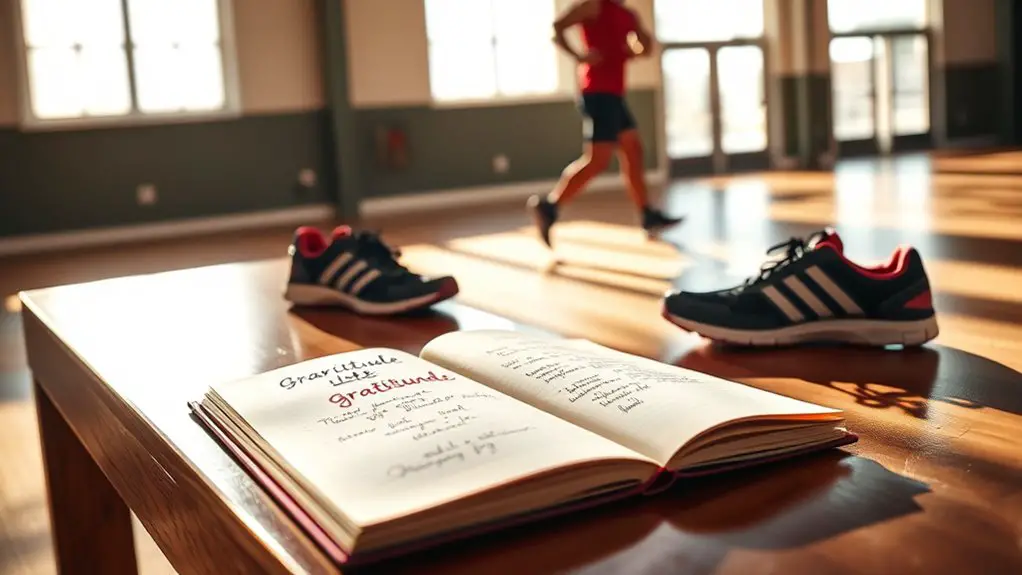Yes, genetics can play a significant role in determining your reaction time as an athlete. It influences how quickly your brain processes information and how your muscles perform. Specific genes, like the COMT and ACTN3, can affect your cognitive speed and muscle composition. While genetics is important, environmental factors and training techniques also come into play. If you want to understand how to optimize your performance based on your genetic profile, there's more to explore.
Understanding Reaction Time in Sports
When it comes to sports, understanding reaction time is essential, as it's often the difference between winning and losing. Your ability to respond quickly to stimuli can determine the outcome of a game. Reaction time measurement involves evaluating how fast you can process information and act on it. This isn't just about physical speed; it's about your cognitive processing too. Your brain must quickly interpret visual and auditory cues, directing your muscles to respond in a split second.
Training to improve your reaction time can give you that edge. Drills that sharpen your focus and enhance your decision-making can lead to faster responses. Whether you're sprinting, diving, or passing, every millisecond counts. Embrace techniques that stimulate both your mind and body, ensuring you're not just reacting but anticipating. Additionally, incorporating agility drills into your training regimen can significantly enhance your foot speed and coordination. Elevate your game by mastering the art of quick thinking and swift action. Freedom in sports comes from seizing every moment!
The Role of Genetics in Athletic Ability
When you think about athletic ability, it's hard to ignore the role genetics play in shaping performance. While your training and environment matter, factors like reaction time can be heavily influenced by your genetic makeup. This brings up the ongoing nature versus nurture debate, raising questions about how much of your athletic potential is set before you even start training.
Genetic Influences on Performance
Although many factors contribute to athletic performance, genetics plays an essential role in determining an athlete's abilities. You might not realize how much your genetic predisposition impacts your potential. Certain genes can influence muscle fiber composition, endurance, and even how your body responds to training. This means that while hard work and dedication are important, your genetic makeup can give you an edge—or present challenges. Understanding your genetic influences can empower you to tailor your training and maximize your strengths. It's about recognizing that genetics lays a foundation for your athletic journey, but it's your passion and determination that will ultimately shape your success. Embrace both aspects; they're part of what makes you unique in the world of sports.
Reaction Time Variability Factors
While many factors affect reaction time, genetics profoundly shapes this critical component of athletic performance. Your unique genetic makeup influences how quickly you can process information and respond to stimuli, which is essential in competitive sports. Differences in cognitive processing speed can determine how effectively you interpret signals from your environment. Additionally, genetics plays a role in sensory integration, affecting how efficiently your brain and body communicate during high-pressure situations. This means that some athletes naturally possess a quicker reaction time due to their genetic predisposition. While training and practice enhance your skills, understanding your genetic limitations can empower you to optimize your performance and embrace your unique athletic potential.
Nature vs. Nurture Debate
The ongoing nature versus nurture debate has significant implications for understanding athletic ability, particularly when it comes to reaction time. You might wonder how much of your potential is rooted in genetic predisposition versus the environmental impact of your training and experiences. While genetics can provide a foundation for speed and agility, it's your dedication to practice, coaching, and lifestyle choices that can truly enhance your skills. Embracing a balance between these factors empowers you to take control of your athletic journey. By recognizing that both nature and nurture play a role, you can maximize your performance through tailored training and mindful habits. Ultimately, it's about harnessing your unique strengths, regardless of where they come from.
Key Genes Associated With Reaction Time
As athletes push their limits, understanding the genetic factors that influence reaction time can be essential for optimizing performance. Research has uncovered several key gene associations that play a role in this critical aspect of athleticism. For instance, variations in the COMT gene can affect neurotransmitter levels, impacting how quickly you can react to stimuli. Similarly, the ACTN3 gene is linked to muscle performance, which can also contribute to faster reactions.
If you're looking for reaction improvement, knowing your genetic background might provide insights into your training regimen. By leveraging this knowledge, you can tailor your workouts to enhance your natural strengths and address any weaknesses. Ultimately, embracing your genetic blueprint isn't just about understanding limitations; it's about revealing your full potential as an athlete. So, explore the science and see how your genes can guide your journey to better reaction times!
Environmental Factors Influencing Reaction Time
Understanding the genetic factors that influence reaction time sets the stage for exploring how environmental factors also play a significant role. Your surroundings can greatly impact your performance.
| Factor | Influence on Reaction Time |
|---|---|
| Environmental Stressors | Can hinder focus and slow reactions |
| Sleep Quality | Poor sleep reduces cognitive function |
| Nutrition Influences | Proper diet fuels energy and sharpens focus |
Cognitive distractions, like noise or anxiety, also play a part. Training environments, where you practice, can either enhance or detract from your skills. The conditions you face in competition settings can add pressure, affecting your psychological factors. Essentially, optimizing these elements—like ensuring quality sleep and nutrition—can free you to react faster and perform better. Additionally, incorporating breathing techniques can help athletes manage stress and improve their reaction times in high-pressure situations.
Studies on Genetic Variability and Performance
When it comes to athletic performance, genetic markers play a vital role in determining your reaction time. Studies have shown that these markers can explain the variability you see among athletes. Understanding these differences could help you optimize your training and enhance your competitive edge.
Genetic Markers Identified
Recent studies have identified several genetic markers that play a fundamental role in athlete reaction time and overall performance. These markers highlight your genetic predisposition, influencing how quickly you can respond in competitive situations. For instance, variations in genes related to muscle fiber composition and neurotransmitter regulation can greatly impact your athletic performance. Understanding these markers gives you insight into your potential and helps tailor training regimens to maximize your strengths. If you're aware of your genetic background, it can empower you to embrace your unique abilities, allowing you to push boundaries. While genetics plays a role, it is important to remember that hard work and dedication are equally significant in achieving your athletic goals.
Performance Variability Explained
Although genetic predispositions can greatly influence an athlete's reaction time, performance variability among individuals often arises from a complex interplay of these genetic factors and environmental conditions. You see, performance metrics aren't solely determined by your DNA; they're also shaped by training, nutrition, and mental resilience. This means that while genetics can give you a head start, it's your choices and environment that truly define your performance. Athlete profiling helps to identify strengths and weaknesses, allowing for tailored training programs that can enhance performance. By understanding both genetic influences and personal circumstances, you can embrace your unique athletic journey, maximizing your potential and celebrating the freedom to shape your own destiny in sports.
The Nature vs. Nurture Debate in Athletics
The debate over nature versus nurture in athletics often centers on how much of an athlete's success is determined by genetics versus their environment and training. You might believe that athlete motivation and rigorous training regimes are essential, but environmental influences can't be overlooked. Coaching strategies play a vital role in shaping performance psychology and skill acquisition, guiding you through the mental and physical challenges of your sport.
Consider how your competitive mindset can be nurtured through effective recovery techniques and proper nutrition impact. These elements can greatly enhance your physical conditioning, making a strong case for nurture in this debate. Ultimately, while genetics provide a foundation, it's the combination of environmental factors and personal dedication that truly shapes an athlete's journey. Embracing a growth mindset may empower you to reach your full potential, finding the perfect balance between innate talent and cultivated skills.
Training Techniques to Improve Reaction Time
To sharpen your reaction time, incorporating specific training techniques can make all the difference. You've got the power to enhance your performance by focusing on a few key areas:
- Reaction Drills: Practice drills that mimic game situations. Use a partner or a coach to throw unpredictable cues at you, so you can react quickly and improve your instinctive responses.
- Cognitive Training: Engage in exercises that challenge your mental agility. Video games that require quick decision-making can be particularly effective. This kind of training sharpens both your mind and reflexes.
- Agility and Speed Work: Incorporate agility ladders and cone drills into your routine. These can boost your foot speed and overall coordination, making it easier to react in high-pressure situations. Additionally, adding visualization techniques to your training regimen can help you mentally rehearse scenarios for quicker instincts.
The Future of Genetic Testing in Sports
As athletes seek to optimize their performance, the role of genetics is becoming increasingly important in sports. Genetic testing holds the key to revealing personalized training regimens tailored to your unique biological makeup. Imagine knowing exactly which areas to focus on for performance enhancement, from speed to endurance, based on your genetic profile. This understanding of genetic predisposition can aid in injury prevention and enhance overall athletic capabilities.
In the near future, this could lead to a more individualized approach to training, allowing you to push your limits without unnecessary trial and error. With advancements in technology, genetic testing might become more accessible and affordable, empowering athletes at all levels to harness their genetic potential.
Implications for Athletes and Coaches
While understanding genetic predispositions can seem challenging, it offers significant advantages for both athletes and coaches. By utilizing genetic assessments, you can reveal insights that optimize your performance. Here's how this knowledge can benefit you:
- Tailored Training: With a clearer understanding of your genetic makeup, you can focus on specific training modalities that enhance your reaction time.
- Injury Prevention: Identifying genetic risk factors helps you and your coach design preventative strategies, keeping you in peak condition and ready to compete.
- Long-term Development: Coaches can create personalized development plans, ensuring that your training aligns with your inherent strengths, promoting sustained growth.
Incorporating strength training exercises such as squats and deadlifts can further enhance your reaction time by improving overall power and stability. Embracing genetic insights not only empowers you but also transforms coaching strategies. This collaborative approach leads to a deeper understanding of performance optimization, giving you the freedom to excel in your sport.
Frequently Asked Questions
How Do Age and Gender Affect Reaction Time in Athletes?
When it comes to reaction time, you can't judge a book by its cover. Age impacts your reaction time, with younger athletes often quicker due to faster neural processing. Gender differences also play a role; studies suggest men may have faster reaction times, but women often excel in endurance sports. As you age, practice and conditioning can help maintain or even improve your reaction time, so don't let age slow you down!
Can Nutrition Influence an Athlete's Reaction Time?
Absolutely, nutrition can influence your reaction time. By focusing on nutrition timing, you can optimize your energy levels, which directly affects your cognitive performance. When you fuel your body correctly before an event, your brain's response time can improve considerably. It's all about finding the right balance of carbs, proteins, and fats to keep you sharp. So, if you want that edge, paying attention to what and when you eat is essential.
What Sports Require the Fastest Reaction Times?
When you think of reaction time sports, imagine a sprinter lunging off the blocks or a goalkeeper diving just in time. These sports require quick reflexes to capitalize on every second. Sports like boxing, table tennis, and basketball demand the fastest reaction times, as every millisecond counts. You'll find that athletes in these fields often train rigorously to sharpen their instincts, allowing them to respond faster than their opponents. Freedom in movement is key!
Are There Specific Exercises to Enhance Reaction Times?
If you're looking to enhance your reaction times, incorporating specific exercises can make a real difference. Try reaction drills like catching a ball or using a reaction ball to sharpen your reflexes. Don't forget cognitive training, too; activities like video games or quick decision-making tasks can boost your mental agility. By mixing physical and mental exercises, you'll develop faster, more responsive reactions, giving you the freedom to excel in your chosen sport.
How Does Fatigue Impact an Athlete's Reaction Time?
Did you know that studies show fatigue can reduce an athlete's reaction time by up to 50%? When you're tired, your body struggles to process information quickly, leading to slower responses. To combat these fatigue effects, you might want to adopt effective recovery strategies, like hydration and rest. Listening to your body and allowing proper recovery can help maintain your performance and keep you feeling free and agile on the field.




